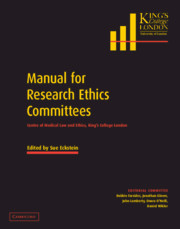Book contents
- Frontmatter
- Contents
- Editorial board
- Acknowledgements
- List of contributors
- Introduction
- Part I
- 1 The ethics of clinical research
- 2 Research ethics committees and the law
- 3 The regulation of medical research: a historical overview
- 4 The regulation of medical research in the UK
- 5 Observational and epidemiological research
- 6 Social survey research
- 7 Approaching qualitative research
- 8 Complementary and alternative medicine: challenges for research ethics committees
- 9 The ethical review of student research in the context of the governance arrangements for research ethics committees
- 10 The ethics of genetic research
- 11 Research or audit?
- 12 Randomised controlled trials
- 13 Determining the study size
- 14 Risk assessment for research participants
- 15 Absorbed radiation in patient and volunteer studies submitted to the ethical committee: a memorandum
- 16 A guide to the use of radioactive materials and radiological procedures for research purposes
- 17 Indemnity in medical research
- 18 The prevention and management of fraud and misconduct: the role of the LREC
- 19 Understanding clinical trials: a model for providing information to potential participants
- 20 The law relating to consent
- 21 Writing information for potential research participants
- 22 The law relating to confidentiality
- 23 Research involving vulnerable participants: some ethical issues
- 24 The ethics of research related to healthcare in developing countries
- Part II
- Index
16 - A guide to the use of radioactive materials and radiological procedures for research purposes
Published online by Cambridge University Press: 08 January 2010
- Frontmatter
- Contents
- Editorial board
- Acknowledgements
- List of contributors
- Introduction
- Part I
- 1 The ethics of clinical research
- 2 Research ethics committees and the law
- 3 The regulation of medical research: a historical overview
- 4 The regulation of medical research in the UK
- 5 Observational and epidemiological research
- 6 Social survey research
- 7 Approaching qualitative research
- 8 Complementary and alternative medicine: challenges for research ethics committees
- 9 The ethical review of student research in the context of the governance arrangements for research ethics committees
- 10 The ethics of genetic research
- 11 Research or audit?
- 12 Randomised controlled trials
- 13 Determining the study size
- 14 Risk assessment for research participants
- 15 Absorbed radiation in patient and volunteer studies submitted to the ethical committee: a memorandum
- 16 A guide to the use of radioactive materials and radiological procedures for research purposes
- 17 Indemnity in medical research
- 18 The prevention and management of fraud and misconduct: the role of the LREC
- 19 Understanding clinical trials: a model for providing information to potential participants
- 20 The law relating to consent
- 21 Writing information for potential research participants
- 22 The law relating to confidentiality
- 23 Research involving vulnerable participants: some ethical issues
- 24 The ethics of research related to healthcare in developing countries
- Part II
- Index
Summary
Anyone wishing to administer radioactive substances to patients or volunteers must do so in accordance with regulations from the Administration of Radioactive Substances Advisory Committee (ARSAC). Notes from ARSAC guiding practitioners are formulated in accordance with the Medicines (Administration of Radioactive Substances) Regulations 1978, and the Medicines (Radioactive Substances) Order 1978.
The Medicines (Administration of Radioactive Substances) Regulations 1978 relate to the protection of the patient or volunteer during the clinical or research use of radioactive substances. According to these Regulations, it is an offence for anyone to administer a radioactive medicinal product to a human being unless he or she is a doctor or dentist holding a certificate issued by the Health Ministers in respect of that product, or a person acting in accordance with the directions of such a doctor or dentist. The Health Ministers receive advice from ARSA Crelevant to the granting of certificates. The Health Ministers define the duration, and conditions for renewal, of a certificate and may suspend, revoke or vary a certificate.
The Medicines (Radioactive Substances) Order 1978 regulates specifically the administration of Radioactive Medicinal Products (RMPs), which are definedas medicinal products that contain or generate a radioactive substance and that contain or generate that substance, in order, when administered to a human being, to utilise the radiation admitted therefrom.
ARSAC requires that a Certificate is needed by any doctor or dentist wishing to administer RMPs to people on a regular basis for one or more of the three following reasons:
(a) All clinical trials as defined in section 31(a) of the Medicines Act (1968) where a CTC or CTX has been granted, or a DDX has been agreed.
[…]
- Type
- Chapter
- Information
- Manual for Research Ethics CommitteesCentre of Medical Law and Ethics, King's College London, pp. 72 - 74Publisher: Cambridge University PressPrint publication year: 2003



